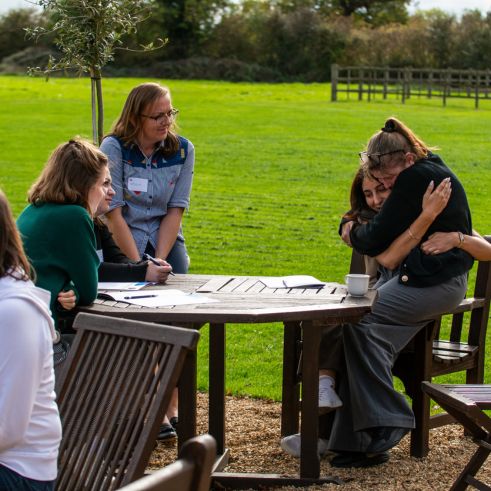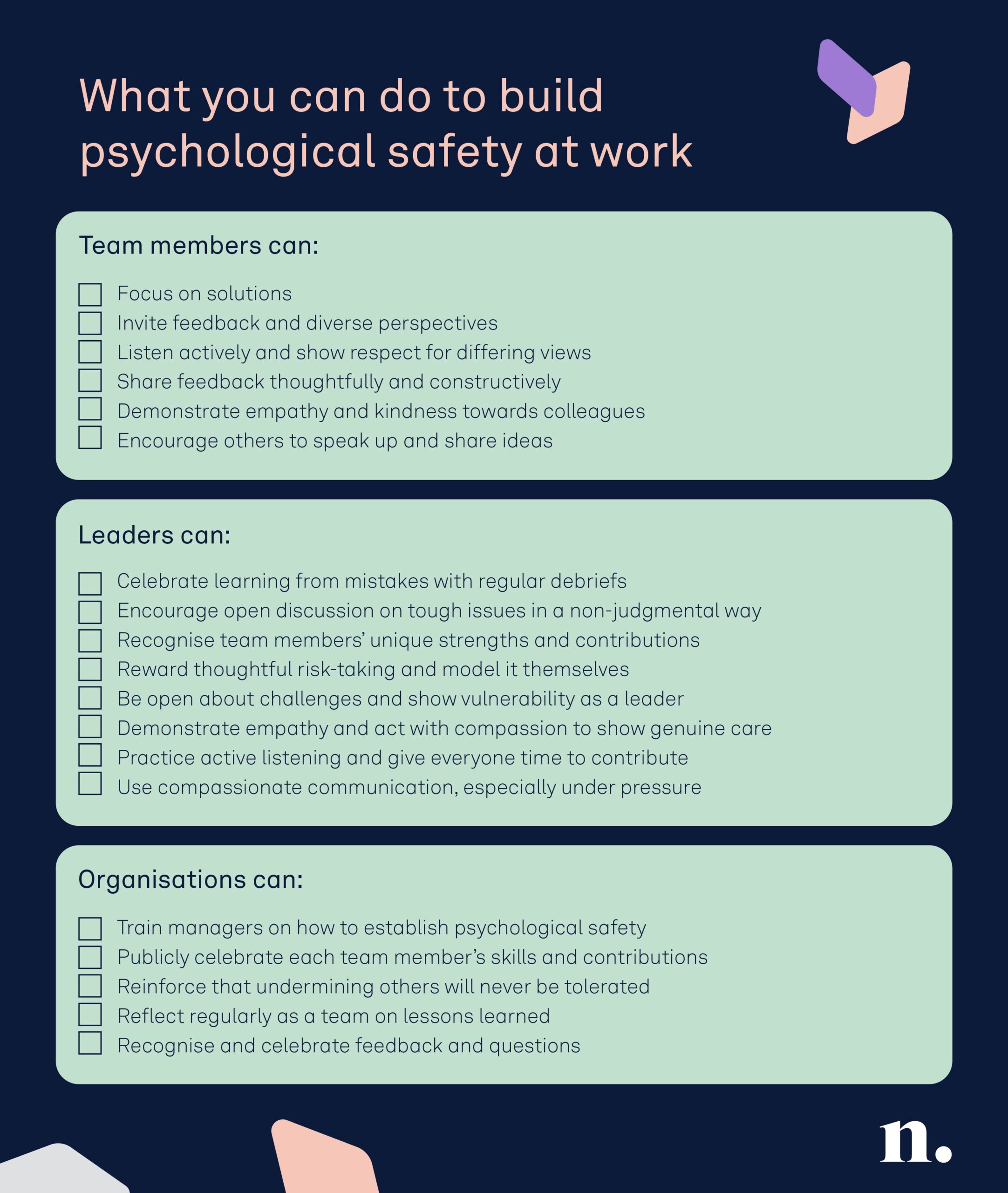
Psychological safety in the workplace: how N supports its educators
Psychological safety at work brings innovation and confidence to teams, helping every member perform at their full potential.
At N, we prioritise creating a supportive and open environment that allows educators to collaborate and bring their full energy to the nursery, benefiting both teams and the children in their care.
What is psychological safety in the workplace?
Psychological safety means feeling comfortable sharing ideas, taking risks, and learning from mistakes without fear of embarrassment or blame. It’s about trust, openness, and mutual respect across a team.
According to Harvard Business School’s Dynamic teaming course, psychological safety includes:
- Willingness to help: Team members support one another, offering guidance and assistance without hesitation.
- Inclusion and diversity: Everyone’s voice matters, and different viewpoints are valued in discussions and decisions.
- Attitude to risk and failure: Mistakes are treated as opportunities to learn and grow, not as setbacks.
- Open conversation: Feedback and questions are encouraged, and honest communication is seen as a strength.
As Amy Edmondson described, it’s “the belief that one will not be punished or humiliated for speaking up with ideas, questions, concerns, or mistakes, and that the team is safe for interpersonal risk-taking.”
Why is psychological safety important?
Teams that feel psychologically safe report stronger well-being and lower stress levels, which leads to better collaboration and overall performance.
When educators and nursery workers feel comfortable speaking up, they’re more likely to share new ideas or flag potential issues early, while adding more creativity and curiosity to their work.
A no-blame culture leads to higher engagement rates and stronger team relationships, as members trust one another.
It’s especially important in early years education, where team communication directly affects the quality of care and learning for children.
When educators and nursery teams know they can express concerns without fear of blame, they can focus their energy on what truly matters, which is helping children learn, grow, and feel secure.
At N, we view psychological safety as a way to build resilience and innovation.
This supportive environment is one of the reasons we’ve been certified as a UK Great Place to Work, with 94% of our team stating they feel N is a physically safe place to work. When our people feel safe and valued, everyone benefits, including the children in our care, who thrive in a setting built on trust and positivity.
The mental and team benefits of psychological safety
Psychological safety brings a wide range of benefits for both individuals and teams, helping people feel more connected and motivated in their work.
Some of the key benefits include:
- Fewer mistakes and incidents
- Smaller impact from errors when they occur
- Faster bouncing back from setbacks
- Greater freedom to explore and improve ideas
- Reduced burnout and turnover
- Increased inclusion and diversity
- Faster learning and stronger collaboration
- More resilience across individuals and teams
Psychological safety also directly supports mental wellbeing. When team members aren’t constantly worried about how their ideas will be perceived or punished, they tend to feel calmer and more focused, rather than stressed or anxious.
For educators and nursery teams, this helps them stay attentive, patient, and responsive to children’s needs and connect with each child in their care.
Poor mental health, often linked to anxiety or depression, has been found to significantly reduce productivity. Creating a psychologically safe workplace helps prevent this, benefiting each worker and the entire organisation.
The difference between psychological safety and “being nice”
Psychological safety isn’t about avoiding difficult conversations. It still requires honesty, but in a way that helps people learn and grow. Teams can disagree respectfully, debate ideas, and give feedback.
A “nice” culture can feel pleasant on the surface, where everyone’s polite and tough topics get brushed aside to keep things easy. But underneath, people might hold back their real opinions or stay quiet about problems, which can stop a team from growing or fixing what isn’t working.
A psychologically safe culture, on the other hand, welcomes honest conversations, even when they feel awkward or uncomfortable. That’s how ideas improve and relationships strengthen, since people don’t have to worry about being judged or shut down.
Over time, this kind of safety allows people to:
- Openly admit and discuss their mistakes
- Raise and tackle tough issues together
- Freely seek help and feedback
- Trust that teammates have good intentions
- Feel secure in their value to the group
For example, when an educator asks their manager a difficult question about a new approach or process, psychological safety ensures that the question is seen as constructive, not confrontational. That distinction is what creates genuine collaboration.
How leaders at N build psychological safety
Research from McKinsey highlights that 89% of employees believe it’s the responsibility of business leaders to create a safe and respectful workplace.
At N, this starts with team inclusivity, where every voice is heard and valued from day one.
Here’s how we help build psychological safety across our nurseries and teams:
1. Encouraging open communication
Leaders hold regular one-to-one check-ins and team huddles where teams can raise questions, share classroom observations, or suggest new learning activities.
When idea sharing is encouraged, small issues are addressed early, before they become bigger problems. When team members are listened to, their confidence can also grow, and they’ll be more willing to contribute ideas and take initiative.
2. Using language that values people
All teams use respectful language in everyday interactions, choosing phrases that acknowledge one another’s effort and expertise. For example, instead of saying “You should have done this differently,” they might say, “I appreciate your approach here. Let’s try to explore a way to make it even better.”
This kind of language reinforces respect and makes team members more willing to share ideas and give feedback openly.
3. Leading with a growth mindset
Mistakes are treated as learning opportunities rather than failures. For example, after a classroom activity doesn’t go as planned, a manager might discuss what happened and how to approach it differently next time.
By modelling curiosity and resilience, leaders help teams feel safe to take risks and try new ideas, rather than avoiding challenges or sticking only to familiar approaches.
4. Compassionate leadership
Leaders show empathy and compassion by acknowledging effort and offering support when challenges arise. For example, if an educator is struggling with a new classroom activity, a manager might check in to listen to their concerns and provide guidance, instead of criticising or ignoring the issue.
5. Tackling poor behaviour quickly
Bullying, exclusion, or disrespect are addressed as soon as they arise. If a team member is excluded from a discussion or a disagreement turns hostile, a leader steps in to mediate and ensure everyone is treated fairly.
Handling issues early prevents tension from escalating, reinforces a respectful culture, and helps collaborators feel safe and supported in their work.
6. Rewarding speaking up
If a team member shares a new idea or raises a concern, leaders acknowledge it openly and provide constructive feedback.
Speaking up can be rewarded by involving the team member in planning or leading the initiative, or providing opportunities for professional development linked to their idea.
7. Flattening hierarchy
Collaboration is encouraged across all levels, rather than relying on rigid layers of authority.
Encouraging input from all team members makes it easier to share insights, ask questions, and contribute solutions, helping teams work more effectively together.
What a resilient team looks like
A resilient team is confident in its abilities and connected through communication and trust. When challenges arise, they work together to find solutions and support one another, focusing on shared goals rather than pointing fingers or assigning blame.
At N, we see resilience in action every day, such as educators collaborating to brainstorm new activities that spark curiosity and learning, and managers adjusting staffing models to enable flexible working in the early years sector. Teams step in to cover for one another when unexpected challenges arise, share ideas to solve problems quickly, and celebrate small wins together.
This kind of resilience is what helps us create meaningful experiences for children and rewarding careers for our team.
What you can do to build psychological safety
Building psychological safety requires effort from everyone. Here are some practical ways to make that happen day-to-day:
Team members can:
- Focus on solutions.
- Invite feedback and diverse perspectives.
- Listen actively and show respect for differing views.
- Share feedback thoughtfully and constructively.
- Demonstrate empathy and kindness toward colleagues.
- Encourage others to speak up and share ideas.
Leaders can:
- Celebrate learning from mistakes with regular debriefs.
- Encourage open discussion on tough issues in a nonjudgmental way.
- Recognise team members’ unique strengths and contributions.
- Reward thoughtful risk-taking and model it themselves.
- Be open about challenges and show vulnerability as a leader.
- Demonstrate empathy and act with compassion to show genuine care.
- Practice active listening and give everyone time to contribute.
- Use compassionate communication, especially under pressure.
Organisations can:
- Train managers on how to establish psychological safety.
- Publicly celebrate each team member’s skills and contributions.
- Reinforce that undermining others will never be tolerated.
- Reflect regularly as a team on lessons learned.
- Recognise and celebrate feedback and questions.

Psychological safety at work
Creating a culture where people can speak up, share ideas, and learn from mistakes makes our nurseries stronger and more effective.
At N, we use psychological safety to empower educators to be confident and connected in their roles.
If you’re passionate about working in an environment that values openness and learning, explore our opportunities in Nursery Educator Jobs or learn more about building a career in Early Years teaching.
When our teams thrive, so do the children in our care.

